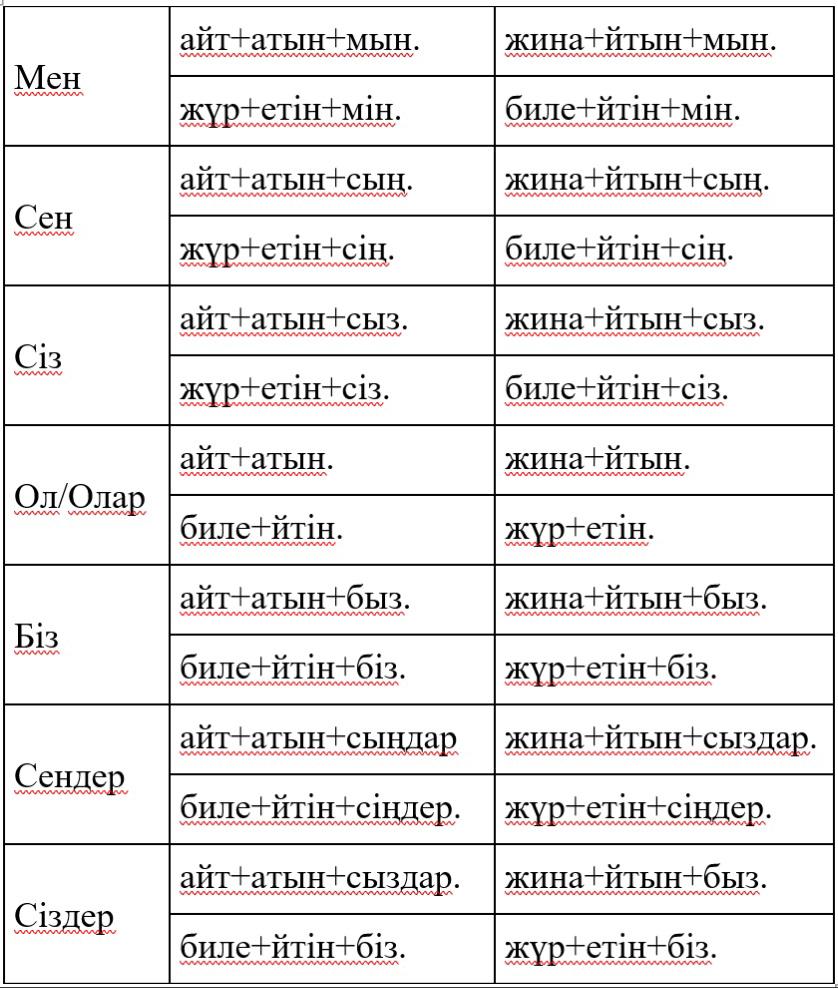Ақпарат беру, нақтылау, мәлімет беру, сипаттау. Қазақстан туралы ақпараттарды жинақтау, түсіну, меңгеру.



Translate the sentences into English.
Ол бұрын өлең жаз+атын.
Мен осы мектепке бар+атын+мын.
Сен бізге жиі кел+етін+сің.
Rules:
- To conjugate with this construction we add атын/етін/йтын/йтін endings according to sound harmony rules and personal endings of conjugation.
- We pick the ending атын if a root-word has a hard vowel and the last letter of a root-word is a consonant.
- We pick the ending етін if a root-word has a soft vowel and the last letter of a root-word is a consonant.
- We pick the ending йтын if а root-word has a hard vowel and the last letter of a root-word is a vowel.
- We pick the ending йтін if a root-word has soft vowel and the last letter of a root-word is a vowel.
- To make up a sentence with this construction in a negative sentence we add negative ending after a root-word, which is followed by one of the атын/етін/йтын/йтін according to sound harmony rules and add conjugation ending.
- We pick the negative ending and conjunction ма if a root-word has a hard vowel and the last letter of a root-word is either vowel or р/й/л/у.
- We pick the negative ending and conjunction ме if a root-word has a soft vowel and the last letter of a root-word is either vowel or р/й/л/у.
- We pick the negative ending and conjunction ба if a root-word has a hard vowel and the last letter of a root-word is ж/з/м/н/ң.
- We pick the negative ending and conjunction бе if a root-word has a soft vowel and the last letter of a root-word is ж/з/м/н/ң.
- We pick the negative ending and conjunction па if a root-word has a hard vowel and the last letter of a root-word is an unvoiced consonant (к/қ/п/с/т/ф/х/ц/ч/ ш/щ).
- We pick the negative ending and conjunction пе if a root-word has a soft vowel and the last letter of a root word is an unvoiced consonant (к/қ/п/с/т/ф/х/ц/ч/ш/щ).
Use
Атын/етін/йтын/йтін endings are used to express the actions, which happened in the past regularly, but this is not true for present time any more. It is analogous to used to construction in English.
Practice
Exercise 1. Translate the following sentences into Kazakh. Read aloud your example to the class.
1. He used to draw often when he was four.
2. In the ancient times Kazakh people were (used to be) nomads.
3. 20 years ago we used to live in this region.
4. You did not use to be so tall.
5. I did not like this taste. (now I like it)



Болымды түрі
Болымсыз түрі
Сұраулы түрі
Grammar
Ауыспалы өткен шақ-Distant past
атын/етін/йтын/итін+жіктік жалғау construction
Ауыспалы өткен шақ-Distant past
атын/етін/йтын/итін+жіктік жалғау construction
